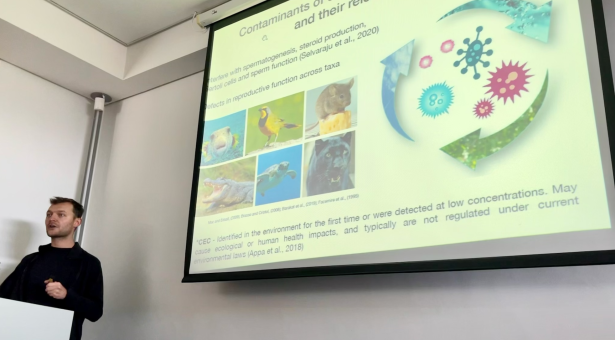Daniel develops leadership skills managing international project at the University of Western Cape

Daniel Marcu, a student based at the UEA, wanted to gain exposure to different laboratory skills, animal research models, communication and leadership skills and so used a personal contact to set up a PIPS placement at the University of the Western Cape, South Africa. Daniel undertook his placement at the start of 2022, during the third year of his PhD, which he found to be excellent timing.
Daniel was working on a multidisciplinary research-focused project assessing the impact of emerging contaminants on ecosystems and human health. The project involved an international collaboration with a Swiss research institute and group in Norway. One of Daniel’s key responsibilities was to co-ordinate the collaboration to determine needs of partners and what could realistically be achieved in the time-frame of the placement and what were more long-term ambitions, essentially acting as Project Manager. Daniel was also involved in brainstorming about grant applications to fund follow-on work. He had several pre-placement on-line meetings to help him prepare for the placement and to start to develop effective working relationships with the partners, so he felt confident to direct the project once in placement. Daniel felt his opinion was valued by the team and he enjoyed having responsibility for leading the placement project and being involved in research that was topical and impactful.
Daniel was involved in sample collection and analysis of urchins from oceanic fish-farms where pesticide contamination was high, and interaction with farmers in the marine environment. He conducted lab work over the course of a month helping to optimise previous experiments undertaken by the research group to generate more robust results with historic and new samples. He learnt new techniques in the field of toxicology and reproductive biology and enjoyed collaborating with experts in human sperm biology which allowed him to gain in knowledge beyond his PhD.
A significant aim of the project was based around raising awareness of the effects of pesticide contamination through outreach activities with stakeholders and through generation of blogs and academic papers to reach wider audiences including regulatory bodies. Daniel’s blog post was also published by other sources and appeared on TV in South Africa. Although Daniel has significant prior experience of science and non-scientific communication, the placement helped him appreciate the perspectives of different audiences including policy makers and refine his ability to write for non-academic audiences. He also found the outreach activities with the local farmers challenging as their livelihoods are dependent on income from fisheries so potentially less responsive to implications of project.
Daniel developed many skills during the internship. “The skills I mostly developed are leadership and confidence. Being the person coordinating a multidisciplinary project gave me the perfect exposure to develop such skills”, reflects Daniel. Daniel also developed problem solving skills by overcoming difficulties in order to drive his projects forward. He had to challenge himself to be creative to perform and communicate science and further developed his communication skills by engaging in team meetings, farm visits and presenting his research findings to key stakeholders.
Daniel felt his PIPS placement experience was a very positive one and he found it the perfect opportunity to develop connections and network with key leaders in his area of interest. “The 3-months internship gives you the right amount of time to develop trust with your chosen organisation and evaluate whether that career path is the right one for you”, reflects Daniel.
Part of Daniel’s work from this placement is now published here:
Marcu, D.; Keyser, S.; Petrik, L.; Fuhrimann, S.; Maree, L. Contaminants of Emerging Concern (CECs) and Male Reproductive Health: Challenging the Future with a Double-Edged Sword. Toxics 2023, 11, 330. https://doi.org/10.3390/toxics11040330
